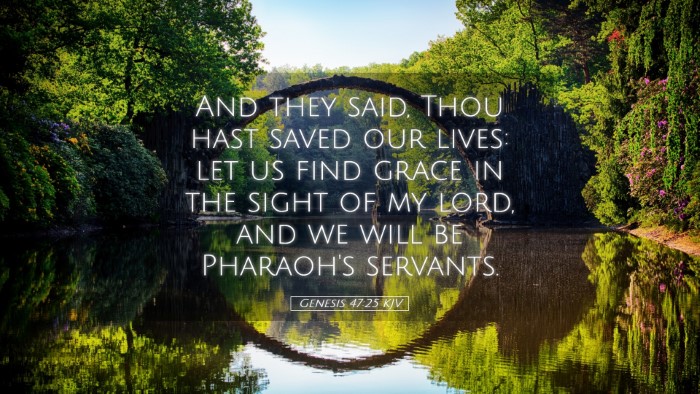Commentary on Genesis 47:25
Verse: “And they said, Thou hast saved our lives: let us find grace in the sight of my lord, and we will be Pharaoh's servants.”
Introduction
This verse captures a pivotal moment in the narrative of Joseph and the unfolding story of Israel's sojourn in Egypt. The context surrounds the Egyptian response to Joseph’s administration during a time of severe famine, revealing their dependence on his wisdom and governance. Insights from notable public domain commentators serve to enrich the understanding of this passage.
Theological Insights
-
Human Dependency: Matthew Henry emphasizes the profound acknowledgment of human frailty and dependence upon divine providence. The Egyptians, faced with utter despair, recognize Joseph as the instrument of God’s mercy. This illustrates the sovereign hand of God at work in the affairs of men.
-
Servanthood: Albert Barnes elucidates the theme of servanthood embedded in this verse. The Egyptians express a desire to be Pharaoh's servants, demonstrating the biblical principle of servitude as a means of survival and divine favor. It suggests that acknowledgment of authority, even in moments of dire need, aligns with the covenantal community's understanding of God’s governance.
-
Grace and Favor: Adam Clarke elaborates on the concept of grace being foundational in the relationship between the Egyptians and Joseph. Their plea for grace indicates a recognition of unmerited favor, illustrating the necessity of humility in approaching authority and seeking preservation.
Contextual Analysis
Analyzing the setting, we find that Joseph’s rise to power, precipitated by divine providence, placed him in a crucial position to manage this crisis. This was not merely a political maneuver; it exemplified God’s overarching narrative of redemption and grace. The Egyptians’ response to Joseph affirms that even in times of crisis, God’s plan for humanity unfolds through people positioned according to His will.
Sociocultural Implications
In the ancient Near Eastern context, servitude was common, yet the willingness of the Egyptians to become servants highlights key aspects of social structure. They were transitioning from autonomy to servitude, indicating a shift in their collective identity. This willingness may prompt reflection on the modern perceptions of authority and servitude, both in a secular and spiritual sense.
Theological Reflection
This passage invites readers to consider their own relationships with authority and the divine. The Egyptians' recognition of their dependence upon Joseph evokes a broader theological principle: true life and sustenance come from acknowledging one’s need for grace and favor. In a world that often prioritizes self-sufficiency, believers are reminded of the posture of humility that is necessary in approaching not just God, but earthly authorities as well.
Applications for Ministry
-
Humility in Leadership: Pastors and church leaders should reflect on this passage to cultivate humility in their leadership. Just as Joseph exhibited servant leadership, modern church leaders are called to prioritize the wellbeing of their congregants over self-interest.
-
Grace in Community: Students and theologians should consider the dynamics of grace within communal contexts. How does the recognition of grace impact community life? This verse serves as a reminder that grace should permeate all relationships.
-
Dependency on God: A primary takeaway for scholars is the necessity of recognizing human dependency on God in all spheres of life. This passage encourages deep theological reflection on how dependency influences theological constructs and practical living.
Conclusion
Genesis 47:25 is a profound reminder of the intricate interplay between divine providence, human response, and societal structure. Commentators like Matthew Henry, Albert Barnes, and Adam Clarke provide a rich tapestry of insights emphasizing servitude, grace, and the recognition of authority. As one contemplates the significance of this verse, it encourages a heart posture that values humility, dependency, and a desire for grace—key elements that connect us to God's sovereign plan and the call to live faithfully in response to His grace.


